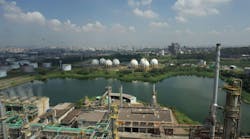South Korea’s new government has become keenly aware of the need to pursue diplomacy in securing its supplies of oil and gas—especially from Iraq.
For South Korea, being resource-poor and one of the world’s leading consumers of oil and gas, diplomacy is a necessary skill to develop, especially following its talks with the Kurdish regional government (KRG).
In fact, Seoul’s first foray into the labyrinths of Middle Eastern oil and gas diplomacy has not met with much approval at home. In a recent editorial, the Korea Times conceded that the incoming government’s vow to focus on resource diplomacy is welcome.
It said the need to make all-out efforts to secure natural resources, particularly oil, can hardly be overemphasized. South Korea, the world’s 10th largest energy consumer, relies on foreign suppliers for 97% of its demand, with slightly more than 4% coming from its own oil fields abroad.
Falling short
What’s left is how to put the new diplomacy into action in the most effective ways, but the paper said recent efforts by President-elect Lee Myung-bak “fell somewhat short of expectations in this regard.”
Lee met Nechirvan Barzani, the head of KRG, who sought cooperation in oil development in the Kurdish region. Lee’s transition team said a memorandum of understanding to explore a reserve of some 2 billion bbl was the “first fruit” of its resource diplomacy.
The Korea Times disagreed. “It’s questionable whether Lee should have met the Kurdistan leader, considering the Iraqi central government lately took issue with a similar previous MOU as infringing on its authority,” the paper said.
“Equally uncertain,” it intoned, “is how the meeting will affect negotiations between SK Corp. and Baghdad to resume Iraq’s crude exports to the nation’s largest refinery that have since been suspended.”
That suspension came into play earlier this month when Iraqi Oil Minister Husayn al-Shahrastani threatened that international oil firms would be blacklisted in his country if they signed contracts with the KRG.
Unpalatable agreement
It remains to be seen how al-Shahrastani will react to the most recent news coming from the meeting between the Kurds and the South Koreans. On Feb. 20 Lee’s government said South Korea’s development of oil fields in northern Iraq is likely to surpass the agreement signed with the Kurds on Feb. 14.
It said Barzani notified Lee’s transition team of his desire to expand the scope of the oil field development program to 3 billion bbl from the initially agreed 1.5-2 billion bbl, while spending on social projects for the region would jump to $5 billion from the earlier $2 billion.
There’s a lot at stake here as al-Shahrastani knows. If the Koreans get away with this deal, then others will try, too. Clearly, to make the agreement even slightly palatable to the Iraqi oil minister, Lee’s government will have to deploy all the diplomacy it can possibly muster up.

